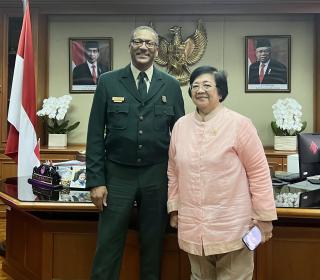Chief Moore marks 30 years of collaboration with Indonesia
WASHINGTON, D.C.— Chief Randy Moore marked over 30 years of collaboration with Indonesian counterparts in a recent visit to the world’s largest island nation for the signing of a memorandum of understanding with the Indonesia Ministry of Environment and Forest.
The visit underscored the importance of the long-term collaboration between Forest Service, U.S. interagency partners in Indonesia, and Indonesian counterparts on preventing and mitigating climate change, responding to current and future natural resource management needs, and supporting Indonesia’s Forest and Other Land Use Net Sink 2030 Policy.
Indonesia is home to the third-largest tropical rainforest in the world, after the Amazon and Congo rainforests, and the world’s largest mangrove forests and peatlands. It is a megadiverse country, harboring the majority of Earth's species and high numbers of endemic species.
Chief Moore commenced his visit by meeting with U.S. interagency partners and donors at the U.S. Embassy in Jakarta. There, he gained a better understanding of U.S. priorities in Indonesia and the context for our environmental work. His face-to-face meetings with the U.S. Agency for International Development mission director, the director of the Department of State’s Bureau of International Narcotics and Law Enforcement Jakarta Office, the economic counselor of the Department of State, the Environment, Science, Technology, and Health Office, and USDA’s Foreign Agricultural Service strengthened our interagency partnerships and allowed for discussion of future collaborations.
On the second day, the Chief met with Minister Siti Nurbaya of the Ministry of Environment and Forest and signed the MOU, which agrees the Forest Service and USAID will contribute to the ministry’s efforts to implement Indonesia’s FOLU Net Sink 2030 Strategy, the Indonesian government’s ambitious plan for the forestry sector to absorb more carbon than it releases by 2030. The Forest Service will contribute expertise from the agency and coordinate support from university partners.

Following the signing, Chief Moore traveled with ministry leadership, U.S. interagency partners, and the Forest Service Indonesia team to Central Kalimantan to see some of the activities that International Programs supports and activities that are important to the ministry’s effort to help Indonesia realize its 2030 strategy.
The group saw social forestry programs that empower communities to manage national forest land while benefiting from the economic, cultural, and ecological services the land provides. For example, at the project site in Dayak village, communities produce sustainable honey, farm fish, and harvest other non-timber forest resources for their personal use and sale while caring for the public land.
The Chief toured a previously burned peatland area and heard from peatlands rehabilitation experts about the process of post-fire peatland restoration. Preventing peatlands fires is an important component to Indonesia meeting its carbon sink and emission targets. Ministry employees showed the Chief how it coordinates fire management and how its law enforcement rangers pursue convictions of groups who commit arson in this fragile area.
Chief Moore also visited peatland restoration areas in Sebangau National Park where, traveling upriver by speedboat, he saw large canals cut into the park to allow for timber transport. These canals are now being restored.
Chief Moore concluded his trip to Indonesia by serving as the main guest of the Protecting our Environment: A commitment to Present and Future Generations event at the U.S. Embassy’s @America cultural center in Jakarta. Chief Moore participated in a Q&A session with university students where he responded to a broad range of questions on climate change, carbon markets, use of Indigenous knowledge, firefighting, knowledge exchange, and working with youth and communities to build a more sustainable future. The students and press were very enthusiastic about meeting Chief Moore and being able to ask him questions directly.



